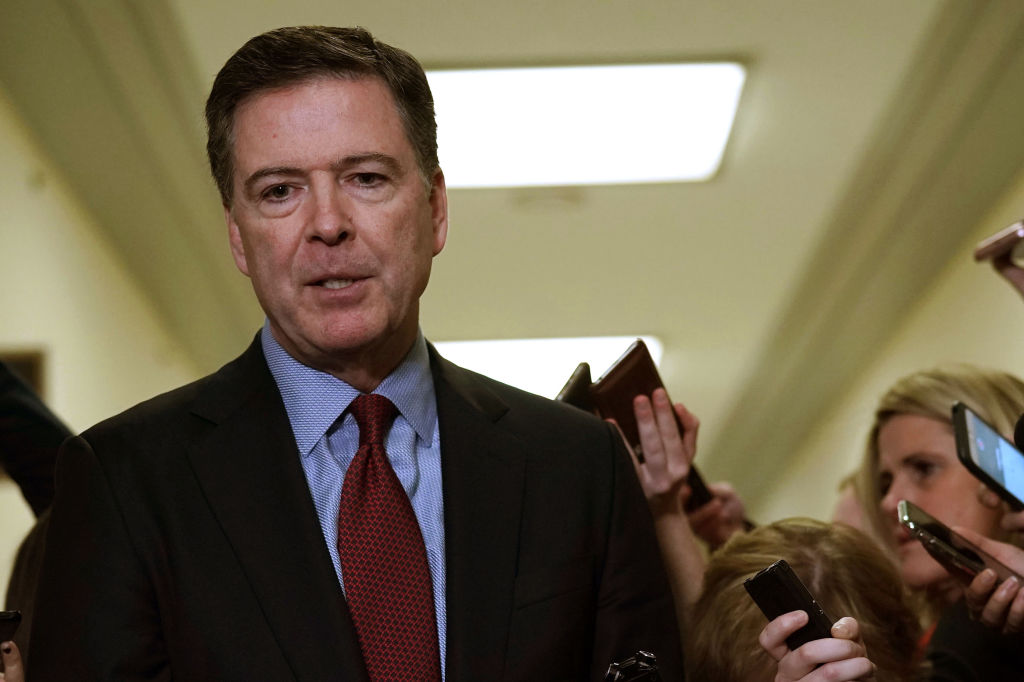The admission by the Department of Justice during an extraordinary Wednesday hearing that the grand jury convened to hand up criminal charges against the former director of the FBI, James Comey, never saw the final indictment a major legal error is an unexpected development that puts the prosecution in peril. The hearing was devoted to arguments on a motion by Mr. Comey who’s charged with lying to Congress and obstruction of justice to dismiss the case as “vindictive” and “selective.” The hearing quickly, though, became a referendum on how the DOJ and the presiding prosecutor, Lindsey Halligan of the Eastern District of Virginia, has handled the prosecution more broadly. At the center of the scrutiny is how prosecutors interacted with the grand jury as well as the process that led to Mr. Comey’s indictment. Mr. Comey has pleaded “not guilty” and claims he was singled out for prosecution due to the mutual antipathy between him and President Trump. The judge began by asking the DOJ’s lawyer, Tyler Lemons, whether the DOJ initially decided against bringing the case before ultimately deciding to charge Mr. Comey. Mr. Lemons acknowledged that he was “aware of written correspondence debating whether charges should be brought.” The Times calls the atmosphere at the hearing “excruciatingly awkward.” The existence of a memorandum to the effect that there were doubts about the case called a “declension” memo would bolster Mr. Comey’s argument that the case against him flows from “animus.” ABC News reports that such a document exists, and that the order to prosecute Mr. Comey precipitated resistance within the DOJ. Mr. Lemons a young prosecutor from the Eastern District of North Carolina who was detailed to the Comey case along with a second assistant United States attorney, for want of a suitable prosecutor in the Eastern Virginia office contended that evidence of deliberations would be “privileged” as an internal work product. Mr. Comey’s lawyer, DOJ alumnus Michael Drebeen a former top deputy to Robert Mueller who was most recently a counselor to Jack Smith told the court that “This is an extraordinary case, and it merits an extraordinary remedy. The president of the United States caused the executive branch to prosecute a perceived political enemy.” Mr. Drebeen urged Judge Nachmanoff to send a “message to the executive branch.” The judge asked him if “Ms. Halligan was the stalking horse or to use a different word a puppet for the president?” Mr. Drebeen responded that she “did what she was told.” The case against Mr. Comey is being led by the interim United States attorney for the Eastern District of Virginia, Lindsey Halligan. Mr. Comey, in a separate effort, contends that she is unlawfully appointed. He argues that she lacks the authority to prosecute him for lying to Congress during 2020 testimony regarding leaks in the investigation into Russian interference in the 2016 election. Ms. Halligan previously represented Mr. Trump as one of his personal lawyers in the Mar-a-Lago case document case in which Mr. Smith charged the once and future president with multiple felonies. Upon his return to power, Mr. Trump brought Ms. Halligan with him to Washington and tasked her with making reforms to the Smithsonian museums. Ms. Halligan, though, has never prosecuted a felony before. Her predecessor, Erik Siebert, resigned under pressure after he reportedly resisted bringing criminal cases against Mr. Comey and New York’s attorney general, Letitia James. Mr. Trump says he wanted Mr. Siebert gone due to the strong support he garnered from Virginia’s Democratic senators, Mark Warner and Tim Kaine. Prior to Mr. Comey being charged, Mr. Trump had, on social media, publicly exhorted Attorney General Pam Bondi to act “NOW!!!” to prosecute Mr. Comey, Ms. James and Senator Adam Schiff. Mr. Siebert resigned soon after. Ms. Halligan, unusually, presented the government’s case against Mr. Comey to the grand jury herself. Her initial indictment included three criminal counts, but jurors decided to indict on only two of them. Ms. Halligan then prepared a second indictment with those two charges. Ms. Halligan has also brought criminal mortgage fraud charges against Ms. James, who had successfully sued Mr. Trump’s businesses for mortgage fraud. The Times reports that the case against Mr. Schiff is active and could yet result in charges of mortgage fraud. In a stunning moment on Wednesday Judge Nachmanoff called to the stand Ms. Halligan, who was in attendance but was not arguing the motion. Judge Nachmanoff told her that “You’re counsel of record. You can address the court.” Ms. Halligan acknowledged that only a “foreperson and another grand juror” saw the final indictment before it was authorized by the magistrate judge, William Fitzpatrick, who’d been assigned by Judge Nachmanoff to handle ancillary issues in the case. Judge Fitzpatrick has expressed his own dismay at the government’s handling of the grand jury, ordering the DOJ to disclose secret documents to Mr. Comey. He writes that the “record points to a disturbing pattern of profound investigative missteps, missteps that led an FBI agent and a prosecutor to potentially undermine the integrity of the grand jury proceeding.” Judge Nachmanoff put the brakes on Judge Fitzpatrick’s order, requesting briefing from both sides. The trial judge’s questions in court, though, suggest that he shares his colleague’s skepticism toward the handling of the case. Mr. Drebeen, seizing on Ms. Halligan’s admission that the indictment was never viewed by the entire grand jury, declared that in the eyes of the law “There is no indictment.” Mr. Drebeen reasons that the government’s blunder would be “tantamount to a complete bar” to prosecution. That’s because the statute of limitations for Mr. Comey’s testimony expired on September 30. Mr. Comey was indicted on September 25. If Judge Nachmanoff decides to dismiss the case whether as selective or because of defects in the manner in which the indictment was handed up the DOJ can appeal to the Fourth United States Appeals Court and, eventually, the Supreme Court.
https://www.nysun.com/article/comey-case-in-disarray-as-government-admits-to-legal-error-and-judge-asks-if-lead-prosecutor-is-a-puppet-for-trump
Comey Case in Disarray as Government Admits to Legal Blunder and Judge Asks if Lead Prosecutor is a ‘Puppet’ for Trump



